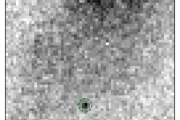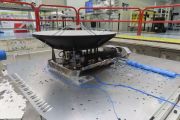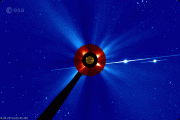
Copernical Team
University spy in Germany 'passed Ariane rocket details to Russia'
 German prosecutors on Thursday said they had charged a Russian scientist working at a Bavarian university with espionage, accusing him of sharing information about Europe's Ariane space rocket programme with Moscow.
The accused, identified only as Ilnur N., was arrested last June, the latest in a string of alleged Russian spies uncovered on German soil at a time of the worst tensions betwe
German prosecutors on Thursday said they had charged a Russian scientist working at a Bavarian university with espionage, accusing him of sharing information about Europe's Ariane space rocket programme with Moscow.
The accused, identified only as Ilnur N., was arrested last June, the latest in a string of alleged Russian spies uncovered on German soil at a time of the worst tensions betwe Blue Origin set to acquire Honeybee Robotics
 Honeybee Robotics (Honeybee) will be acquired by Blue Origin. With major operations in Longmont, Colorado and Altadena, California, Honeybee will become a wholly owned subsidiary of Blue Origin, headquartered in Kent, Washington. The deal between Honeybee's parent organization, Ensign-Bickford Industries, and Blue Origin is expected to close in mid-February. Terms of the deal are not being discl
Honeybee Robotics (Honeybee) will be acquired by Blue Origin. With major operations in Longmont, Colorado and Altadena, California, Honeybee will become a wholly owned subsidiary of Blue Origin, headquartered in Kent, Washington. The deal between Honeybee's parent organization, Ensign-Bickford Industries, and Blue Origin is expected to close in mid-February. Terms of the deal are not being discl Physicist solves century old problem of radiation reaction
 A Lancaster physicist has proposed a radical solution to the question of how a charged particle, such as an electron, responded to its own electromagnetic field.
This question has challenged physicists for over 100 years but mathematical physicist Dr Jonathan Gratus has suggested an alternative approach - published in the Journal of Physics A- with controversial implications.
It is w
A Lancaster physicist has proposed a radical solution to the question of how a charged particle, such as an electron, responded to its own electromagnetic field.
This question has challenged physicists for over 100 years but mathematical physicist Dr Jonathan Gratus has suggested an alternative approach - published in the Journal of Physics A- with controversial implications.
It is w ESA has the tension on the pull
 ESA engineers need to be certain of the strength and tensile behaviour of candidate materials for coming space missions - so they pull them apart.
This tensile testing machine (otherwise known as a universal testing machine) does exactly that: a test sample is placed between its two sets of 'jaws' and subjected to a steadily increasing pull force, until the moment of fracture.
The ap
ESA engineers need to be certain of the strength and tensile behaviour of candidate materials for coming space missions - so they pull them apart.
This tensile testing machine (otherwise known as a universal testing machine) does exactly that: a test sample is placed between its two sets of 'jaws' and subjected to a steadily increasing pull force, until the moment of fracture.
The ap New MeerKAT radio image reveals complex heart of the Milky Way
 The South African Radio Astronomy Observatory (SARAO) has released a new MeerKAT telescope image of the centre of our Galaxy, showing radio emission from the region with unprecedented clarity and depth. The international team behind the work is publishing the initial science highlights from this image in The Astrophysical Journal. The article is accompanied by a public release of the data to the
The South African Radio Astronomy Observatory (SARAO) has released a new MeerKAT telescope image of the centre of our Galaxy, showing radio emission from the region with unprecedented clarity and depth. The international team behind the work is publishing the initial science highlights from this image in The Astrophysical Journal. The article is accompanied by a public release of the data to the Nearly 1,000 mysterious strands revealed in Milky Way's center
 An unprecedented new telescope image of the Milky Way galaxy's turbulent center has revealed nearly 1,000 mysterious strands, inexplicably dangling in space.
Stretching up to 150 light years long, the one-dimensional strands (or filaments) are found in pairs and clusters, often stacked equally spaced, side by side like strings on a harp. Using observations at radio wavelengths, Northwester
An unprecedented new telescope image of the Milky Way galaxy's turbulent center has revealed nearly 1,000 mysterious strands, inexplicably dangling in space.
Stretching up to 150 light years long, the one-dimensional strands (or filaments) are found in pairs and clusters, often stacked equally spaced, side by side like strings on a harp. Using observations at radio wavelengths, Northwester Studying the Big Bang with Artificial Intelligence
 Can machine learning be used to uncover the secrets of the quark-gluon plasma? Yes - but only with sophisticated new methods.
It could hardly be more complicated: tiny particles whir around wildly with extremely high energy, countless interactions occur in the tangled mess of quantum particles, and this results in a state of matter known as "quark-gluon plasma". Immediately after the Big B
Can machine learning be used to uncover the secrets of the quark-gluon plasma? Yes - but only with sophisticated new methods.
It could hardly be more complicated: tiny particles whir around wildly with extremely high energy, countless interactions occur in the tangled mess of quantum particles, and this results in a state of matter known as "quark-gluon plasma". Immediately after the Big B A VIPER in the Sand
 The test version of NASA's Volatiles Investigating Polar Exploration Rover, or VIPER, kicks up high sinkage sand-like material while transiting NASA Glenn's Simulated Lunar Operations Laboratory, or SLOPE bed. In November 2021, the latest test rover visited SLOPE to complete the next iteration of mobility testing, a critical step toward ensuring the rover is ready for its 2023 mission to the Moo
The test version of NASA's Volatiles Investigating Polar Exploration Rover, or VIPER, kicks up high sinkage sand-like material while transiting NASA Glenn's Simulated Lunar Operations Laboratory, or SLOPE bed. In November 2021, the latest test rover visited SLOPE to complete the next iteration of mobility testing, a critical step toward ensuring the rover is ready for its 2023 mission to the Moo Making matter from collisions of light
 Nuclear scientists have used a powerful particle accelerator to create matter directly from collisions of light. Scientists predicted this process in the 1930s, but it has never been achieved in a single direct step.
The researchers accelerated two beams of gold ions to close to the speed of light in opposite directions. At such speeds, each gold ion is surrounded by particles of light (re
Nuclear scientists have used a powerful particle accelerator to create matter directly from collisions of light. Scientists predicted this process in the 1930s, but it has never been achieved in a single direct step.
The researchers accelerated two beams of gold ions to close to the speed of light in opposite directions. At such speeds, each gold ion is surrounded by particles of light (re Advances in Space Transportation Systems Transforming Space Coast
 From a seaside perch overlooking the hustle and bustle of ships coming and going at Port Canaveral on Florida's east coast, Dale Ketcham reflects on decades of history with nostalgia.
"I moved here and learned how to walk on Cocoa Beach three years before NASA was created" in 1958, he said.
Not only can Ketcham trace his life alongside the U.S. space program, he's had a firsthand vie
From a seaside perch overlooking the hustle and bustle of ships coming and going at Port Canaveral on Florida's east coast, Dale Ketcham reflects on decades of history with nostalgia.
"I moved here and learned how to walk on Cocoa Beach three years before NASA was created" in 1958, he said.
Not only can Ketcham trace his life alongside the U.S. space program, he's had a firsthand vie 



































